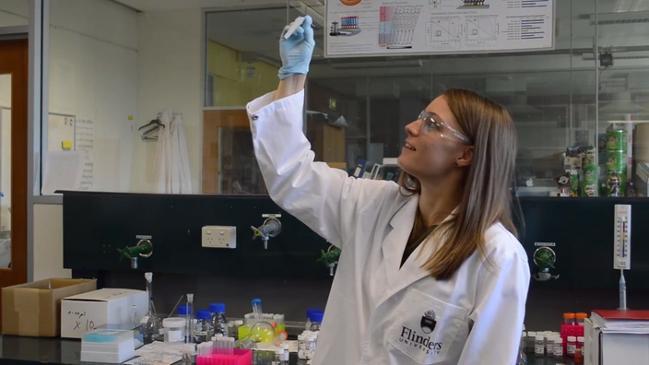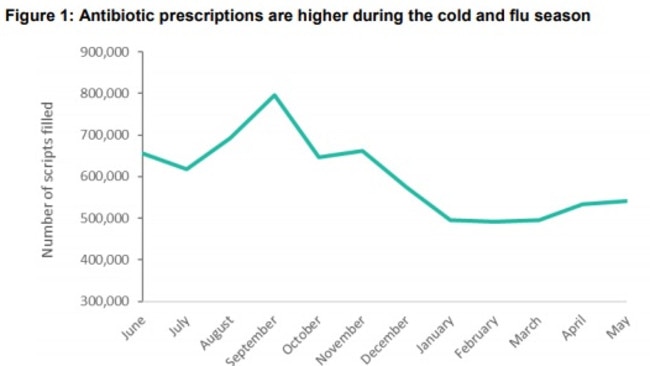Antibiotic resistance: Worldwide threat to human health
MEDICINE is costing us money when we’re really not that much better off taking it — and there’s proof.

OUR obsession with antibiotics is driving us to take them when we don’t need to, wasting 20 million tonnes of medicine and putting us at serious risk.
Antibiotic resistance expert Professor Chris Del Mar said only five in 100 people benefited from antibiotics.
The lack of new antibiotics coupled with their overprescription has led to bacteria becoming increasingly resistant, leaving the medicine less effective and putting people at greater risk of dying from common infections.
Antibiotic resistance is said to be one of the biggest threats to human health today.
“Antibiotics aren’t nearly as effective as people think,” the Bond University academic said.
“It’s unbelievable. That (20 tonnes) is an important figure.”
The practising GP spends a lot of his time talking patients out of antibiotics that will hardly improve their symptoms and instead put them at risk of nasty side effects.
Dr Del Mar said people liked to think that antibiotics reduced their infection in three days. The reality is, for cases like middle ear infection, it is 2.5 days.
“It only shortens it by half a day,” he said.
“Most people think it’s got a much bigger effectiveness. For a cough it’s even less.
“What we’ve been saying is antibiotics prescribed in the community causes resistance — we create resistance in bacteria in people — and that’s causing problems in the hospital sector.
“People are bringing the resistance in with them, whereas 20 years ago they were creating resistance in hospitals.”
A total of 19 per cent of serious blood infections in Australia are resistant to antibiotics, a rate that’s higher than France, Germany and the United Kingdom.
In 2015, our antibiotic prescribing rate of 23.5 Defined Daily Doses per 1000 people was higher than the OECD average of 20.6.
Dr Del Mar, who heads up the Centre for Research Excellence on Minimising Antibiotic Resistance in the Community, said the problem was GPs prescribing outside the guidelines.
Recent research estimates GPs were prescribing antibiotics for acute respiratory infections at rates up to nine times higher than recommended.
RELATED: Hospitals blamed for rise of antibiotic resistance

Such an infection of the ears, nose, sinuses, throat or lungs is viral, not bacterial, and therefore cannot be treated by antibiotics.
In the early stages, it can be difficult for doctors to tell if the infection is mild or the start of a more serious illness that does need treatment, such as acute meningitis.
In Australian hospitals in 2017, 23.3 per cent of antibiotic prescribing did not comply with guidelines.
“What makes this a wicked problem is first of all, for GPS, they don’t see the problem of resistance that’s happening in hospitals and second of all, they’re entrenched in it, this knee-jerk reaction and standard treatment,” Dr Del Mar said.
“We need to conserve antibiotics for when it can really make a difference.
“For the average kid it makes a tiny bit of difference and causes side effects.
“The chance of getting these side effects is about the same as getting improvement.”
The World Health Organisation lists antibiotic resistance as one of the biggest threats to global health, food security, and development today.
A growing number of infections — such as pneumonia, tuberculosis, gonorrhoea, and salmonellosis — are becoming harder to treat as the antibiotics used to treat them become less effective.
WHO study results released earlier this years showed “high levels” of antibiotic resistance worldwide.
Resistance to penicillin — the medicine used for decades worldwide to treat pneumonia — ranged from zero to 51 per cent among reporting countries.
Dr Del Mar said he sometimes gave a prescription but suggested the patient did not fill it and see if they needed to. Usually they don’t.
The issue is so big Bond was awarded a $2.5 million grant from the National Health and Medical Research Council for an Australia-first project aimed at curbing the global epidemic by focusing on antibiotic use in primary care.
The centre is staffed by a team of 20 researchers, fellows and PhD students.
That follows on from a previous five-year $2.5 million grant awarded by the NHMRC in 2012 for the same issue.



